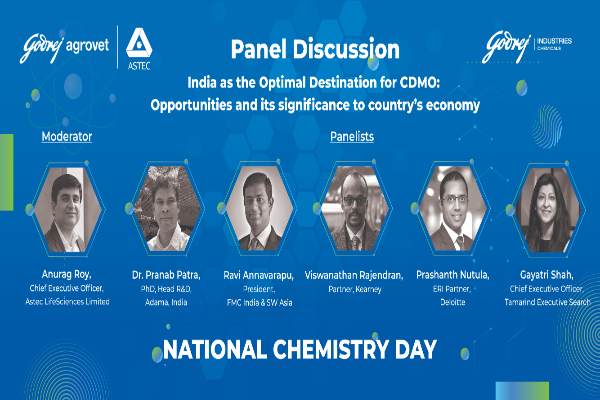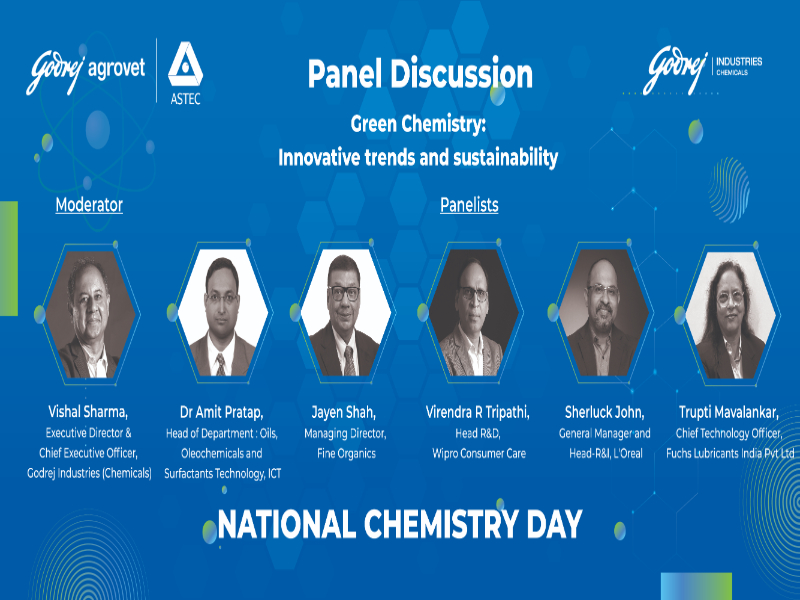Nadir Godrej highlighted the importance of cross-industry collaboration to foster innovation and reduce emissions

Godrej Industries Group (GIG) celebrated National Chemistry Day 2024 by hosting a Chemistry Conclave that brought together leaders from academia and the chemical industry to discuss the future of chemistry in India. The event, organized by Godrej Chemicals and Astec LifeSciences, focused on the transformative trends and technologies that are redefining the chemical sector, with a particular emphasis on sustainability and green chemistry.
India’s chemical industry, a key driver of the economy, contributes 7% to the national GDP and ranks sixth globally. The sector is not only integral to various industries but is also on the cusp of a significant transformation driven by the need for sustainable and eco-friendly solutions. With global concerns about environmental impact and the push towards a circular economy, the industry is increasingly adopting green chemistry practices, which minimize waste and reduce hazardous substances.
Nadir Godrej, Chairman and Managing Director of Godrej Industries Limited, delivered the keynote address by reciting a poem, emphasizing the crucial role of chemistry in everyday life and its potential to drive sustainable growth. He highlighted the importance of cross-industry collaboration to foster innovation and reduce emissions, urging stakeholders to work together to advance the chemical industry's role in driving a circular economy.
This was followed by an insightful session by Dr Ashish Lele, Director of CSIR-National Chemical Laboratory, who highlighted that the chemical industry stands at the forefront of innovation, driving sustainable solutions that are integral to modern life. As we embrace the challenges of the future, our focus remains on advancing green chemistry, reducing carbon footprints, and ensuring that our industry not only grows but thrives responsibly.
Avinash Goyal, senior partner at McKinsey and Company, presented a thought provoking segment on how India has the potential to become a global chemical powerhouse, but it needs to focus on innovation, sustainability, and resilience. The chemical industry has seen a slowdown in growth due to factors such as stalling demand, capacity additions, and commodity price fluctuations. The world order is changing, and it's important to consider how this will impact leadership and institutions.
The conclave featured two engaging panel discussions, each addressing key issues facing the industry. Moderated by Anurag Roy, CEO of Astec LifeSciences Limited, the first panel, India as a CDMO Hub – Unlocking Potential, delved into India's potential to become a global hub for Contract Development and Manufacturing Organizations (CDMOs). Mr. Roy emphasized India’s strong process engineering capabilities, abundant skilled workforce, and robust manufacturing infrastructure as critical factors that position the country to lead in this space.
Sharing his perspective on India’s evolving role in the global CDMO industry, Vishwanathan Rajendran, Senior partner at Kearney, highlighted the importance of establishing independent competitiveness by stating that India no longer needs to be seen as just 'China plus one.' We must establish our own fundamental competitiveness in chemistry, capability, and innovation. It's time to shift from being the alternative to being the leader.
Dr. Ravi Annavarapu, President of FMC Corporation India, highlighted the role of regulatory frameworks in promoting green chemistry by stressing that supportive policies and regulations are essential to encouraging companies to adopt sustainable practices. Government policies must align with industry goals to foster the adoption of green chemistry. Clear guidelines and incentives will help companies transition to more sustainable methods.
Dr. Pranab Patra, Head of R&D at Adama, emphasized the need for continuous innovation in green chemistry. He discussed how companies are implementing closed-loop systems to minimize waste and maximize the recycling and reuse of materials. Innovation in green chemistry is about finding new ways to do more with less—less waste, less energy, and fewer harmful substances.
Prasanth Nutulla, Partner at Deloitte addressed the importance of ongoing investment in innovation and research in the face of global market shifts. To ensure long-term competitiveness, the Indian chemical industry must continue to invest in R&D and innovation, especially as global dynamics shift. While short-term gains may arise from geopolitical changes, it’s the sustained focus on the right processes that will secure our industry's future.
Taking the discussion onto a new level, Gayatri Shah, CEO of Tamarind Executive Search shared her insights on the importance of innovation, collaboration, and addressing talent gaps in India's CDMO sector. India has established itself as a significant player in the global supply chain, but to sustain this growth, we must foster a mindset shift towards innovation and R&D. Collaboration between academia, government, and industry is essential to bridge the talent gap and prepare us for the future.
The second panel, led by Vishal Sharma, Executive Director and CEO of Godrej Industries Limited (Chemicals), focused on the increasing importance of green chemistry in the industry. Mr. Sharma discussed the rising trend of adopting green practices that not only benefit the environment but also offer economic advantages. Green chemistry is no longer just a buzzword; it’s a necessity. By reducing environmental impact while maintaining performance and profitability, we can drive sustainable growth in the chemical sector.

Green chemistry is about ensuring that every process we practice is sustainable, using natural resources efficiently and minimizing waste, as said by Dr Amit Pratap, HoD, ICT. By turning by-products into raw materials for the next stage of production, we can create a life cycle that is both environmentally friendly and economically viable. This approach is already being implemented in industries like vegetable oils and oleochemicals, where sustainability and green chemistry are not just concepts but practiced realities.
Jayen Shah, CEO of Fine Organics, shared insights on the evolving global market for chemical manufacturing and the opportunities it presents for India. He underscored the need for building strategic partnerships with global players to leverage India’s strengths. The global demand for high-quality, sustainable chemical products is growing. India can meet this demand by building strong, collaborative relationships with international partners.
Virendra Tripathi, Head of R&D at WIPRO emphasised on sustainability and innovation in product design. Sustainability is the way to be a leader in the market. This approach not only supports business sustainability goals but also ensures that products meet consumer needs without compromising on efficacy.
According to Sherluck John, GM and head of R&I at L’Oréal, sustainability is no longer just an option; it's becoming a necessity. Consumers, particularly in the West, are increasingly conscious of the environmental impact of their purchases. It's only a matter of time before advancements in green chemistry and biotechnology make sustainable products both high-performing and affordable.
Trupti Mavalankar, CTO of Fuchs Lubricants spoke about focusing on developing specific lubricants for EVs, including coolants for thermal management and greases for electric motor bearings, moving towards sustainability and eliminating the use of fossil-based products.
The summit also featured insightful speeches from Balram Singh Yadav, Managing Director of Godrej Agrovet Limited, and Burjis Godrej, Executive Director & COO – Crop Protection Business, GAVL. They discussed the critical role of chemistry in agriculture and the growing need for sustainable solutions to meet global food demands. "Agriculture relies heavily on chemistry, and as we look to the future, we must develop solutions that are not only effective but also environmentally responsible," said Yadav.
Burjis Godrej echoed these sentiments, highlighting the importance of innovation in crop protection and sustainability. "The future of agriculture is intertwined with the future of chemistry. By innovating in ways that protect our crops and our environment, we can ensure food security for generations to come," he stated.
Bhavana Bindra, MD of Lubrizol Corporation reiterated the potential of chemical industry of India, because the pace at which it's growing and the projections which are there for this industry, the sky is the limit on what we can make happen in India. It is time that India also looked at the high volume products and made it happen because the demand does exist.
Overall, the discussions underscored the need for ongoing investment in R&D, the importance of green chemistry, and the power of collaboration in driving the industry forward. The conclave concluded with a collective call to action, urging stakeholders to continue the dialogue and take concrete steps towards realizing the potential of India’s chemical industry.
Godrej Industries Group, through this event, not only showcased its leadership in the chemical sector but also reaffirmed its commitment to sustainability and innovation. As the industry evolves, such platforms for exchanging ideas and fostering partnerships will be crucial in ensuring that India remains at the forefront of global chemical advancements.
Subscribe to our newsletter & stay updated.